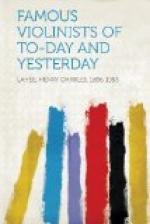He is a master of technique, and surmounts all difficulties with ease; his tone is pure, and, though not large, is satisfying, and in his interpretation of the great works he never attempts to enforce his personality upon the hearer,—in short, he is a true artist. As a conductor he has marked ability, and as a quartet player he has made a reputation which will live in the history of music in America, if not in the whole world.
Charles Gregorowitsch, who visited America in 1898, has risen in a very short time to a place among the leading violinists of the world.
He was born in 1867 at St. Petersburg, and, his talent making itself manifest in the usual manner, he was taught by his father until he was of an age to be sent to Moscow, where he studied until his fifteenth year, under Besekirskij and Wieniawski. From Moscow he was sent to Vienna, where he became a pupil of Dont, and finally he studied under Joachim in Berlin, where he gained the Mendelssohn prize.
Gregorowitsch was the last pupil of Wieniawski, and that master was so impressed with the great promise of the boy that on first hearing him he offered to take him as a pupil gratis. Few violinists have had the advantage which has fallen to the lot of Gregorowitsch, of receiving instruction from so many great teachers.
Gregorowitsch has travelled extensively throughout Europe, has been highly honoured in Russia, where the Czar granted him exemption from military service, and decorated by the King of Portugal. In London he made his first appearance in 1897, at the Queen’s Hall Symphony concerts.
M. Gregorowitsch is remarkable for a large tone, and in the smoothness and finish of his playing he has been compared with Sauret and with Sarasate.
A far greater sensation was caused in America by Willie Burmester than by Gregorowitsch.
Burmester was born in Hamburg in 1869, and received his first instruction from his father. He owned his first violin when he was four years of age, and it came to him from a Christmas tree. This served to show the talent which he possessed, and the next year he received a better violin, and began to study in earnest.
When he was eight years old his father took him to Berlin to consult Joachim, who was, and is, regarded as the oracle for violinists. Joachim gave some encouragement to the parent, although he does not seem to have given much to the boy, who in consequence felt somewhat bitter. Four years later he was again taken to the Berlin Hochschule, to pass his entrance examination. On this occasion he received the recognition of the jury, and was admitted to the school, where he began a rigorous course of technical study. At the end of four years’ study under Joachim he was refused a certificate, for some reason not stated, and he went to Helsingfors in Finland, where he worked according to his own ideas, which were to unlearn all he had studied, and begin afresh. During this period he worked with the greatest perseverance, practising nine or ten hours a day, and thus developed the wonderful technique which has astonished the world. For three years he continued this work, supporting himself meanwhile with a modest appointment which he had obtained.




